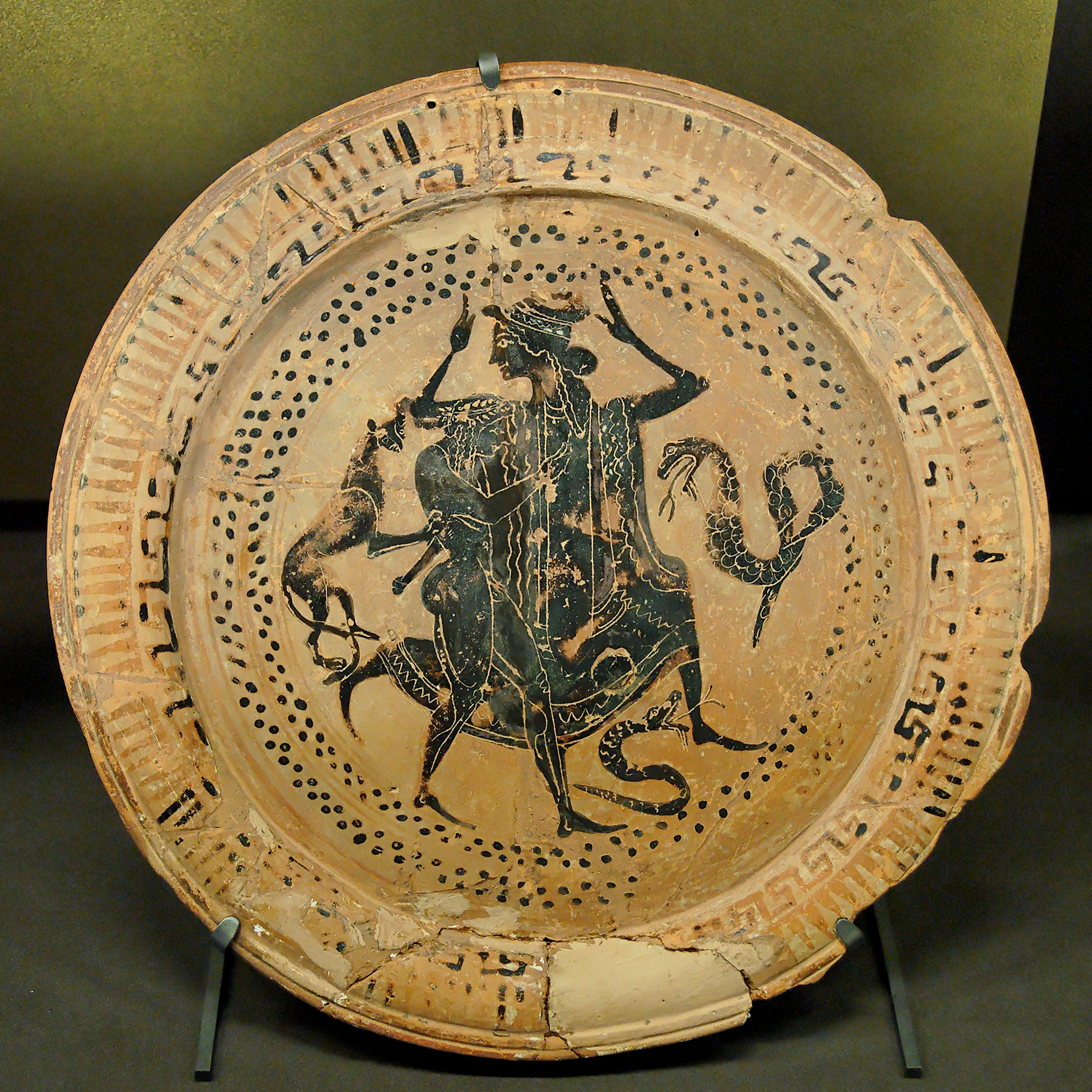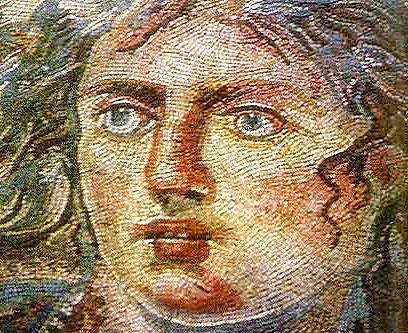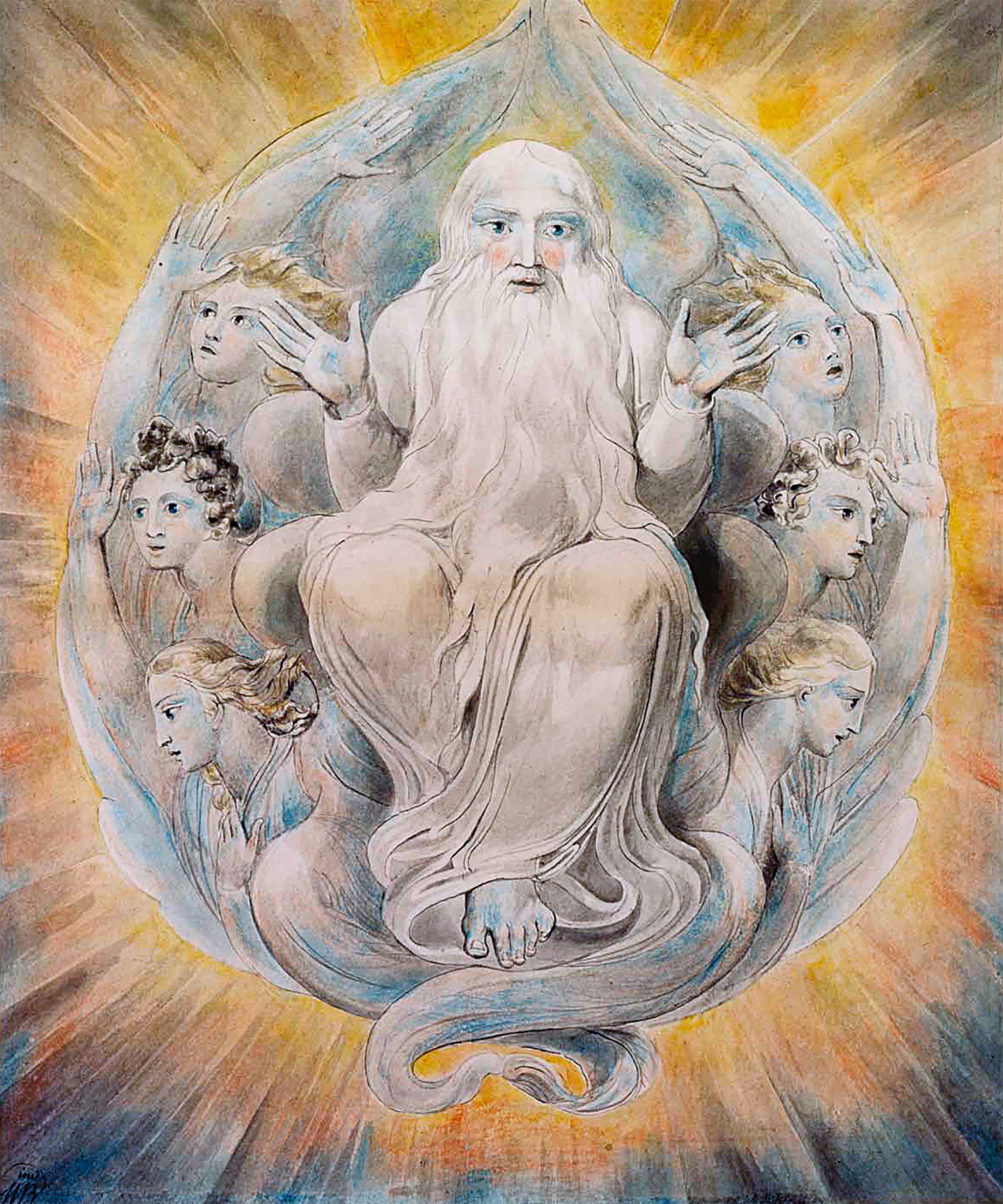|
Thetys
Thetis ( , or ; ) is a figure from Greek mythology with varying mythological roles. She mainly appears as a sea nymph, a goddess of water, and one of the 50 Nereids, daughters of the ancient sea god Nereus. When described as a Nereid in Classical myths, Thetis was the daughter of Nereus and Doris, and a granddaughter of Tethys with whom she sometimes shares characteristics. Often she seems to lead the Nereids as they attend to her tasks. Sometimes she also is identified with Metis. Some sources argue that she was one of the earliest of deities worshipped in Archaic Greece, the oral traditions and records of which are lost. Only one written record, a fragment, exists attesting to her worship and an early Alcman hymn exists that identifies Thetis as the creator of the universe. Worship of Thetis as the goddess is documented to have persisted in some regions by historical writers, such as Pausanias. In the Trojan War cycle of myth, the wedding of Thetis and the Greek hero ... [...More Info...] [...Related Items...] OR: [Wikipedia] [Google] [Baidu] |
Tethys (other)
Tethys or Tethis may refer to: * Tethys (database), an online knowledge management system about the environmental effects of offshore renewable energy * ''Tethys'' (gastropod), genus of gastropods in the family Tethydidae * Tethys (moon), a natural satellite of Saturn * Tethys (mythology), a Titaness in Greek mythology * ''Thetys'' (salp), a genus of gelatinous sea salp * Tethys Ocean, a Mesozoic-era ocean between the continents of Gondwana and Laurasia * Tethys Research Institute, a non-governmental scientific organisation based in Italy * "Tethys", a song from '' The Ocean of the Sky'' by The Used * Tethys, the Japanese name for "Thetis", a boss character in '' Mega Man ZX Advent'' * Tethys River, an interplanetary waterway in Dan Simmons's '' Hyperion Cantos'' See also *Thetis (other) Thetis is a sea nymph in Greek mythology. Thetis, Thétis, or Thetys may also refer to: Greek mythology * Thetis, the name of one of the Hesperides In Greek mythology, the Hespe ... [...More Info...] [...Related Items...] OR: [Wikipedia] [Google] [Baidu] |
Thetis (other)
Thetis is a sea nymph in Greek mythology. Thetis, Thétis, or Thetys may also refer to: Greek mythology * Thetis, the name of one of the Hesperides In Greek mythology, the Hesperides (; , ) are the nymphs of evening and golden light of sunsets, who were the "Daughters of the Evening" or "Nymphs of the West". They were also called the Atlantides () from their reputed father, Atlas (mytholog .... Astronomy * 17 Thetis, an asteroid * Thetis Regio on Venus Places * Thetis (island), Crete, Greece * Thetis Island, British Columbia * Thetis Lake, British Columbia * Lake Thetis, Western Australia * Mount Thetis, Tasmania * Bahía Thetis, Mitre Peninsula, Tierra del Fuego Province Ships * ''Thetis''-class gunboat, a gunboat class of the Hellenic Navy * , a class of patrol boats of the United States Coast Guard * ''Thetis''-class patrol vessel, a ship class of the Royal Danish Navy * , various ships of the French Navy * HDMS ''Thetis'' (F357), the first Royal Danish Navy ... [...More Info...] [...Related Items...] OR: [Wikipedia] [Google] [Baidu] |
Tethys (mythology)
In Greek mythology, Tethys (; ) was a Titans, Titan daughter of Uranus (mythology), Uranus and Gaia (mythology), Gaia, a sister and wife of the Titan Oceanus, and the mother of the River gods (Greek mythology), river gods and the Oceanids. Although Tethys had no active role in Greek mythology and no established cults, she was depicted in mosaics decorating baths, pools, and triclinium, triclinia in the Greek East, particularly in Antioch and its suburbs, either alone or with Oceanus. Genealogy Tethys was one of the Titan offspring of Uranus (Sky) and Gaia (Earth). Hesiod lists her Titan siblings as Oceanus, Coeus, Crius, Hyperion (mythology), Hyperion, Iapetus (mythology), Iapetus, Theia, Rhea (mythology), Rhea, Themis, Mnemosyne, Phoebe (Titaness), Phoebe, and Cronus. Tethys married her brother Oceanus, an enormous river encircling the world, and was by him the mother of numerous sons (the River gods (Greek mythology), river gods) and numerous daughters (the Oceanids). Accordi ... [...More Info...] [...Related Items...] OR: [Wikipedia] [Google] [Baidu] |
Creator Deity
A creator deity or creator god is a deity responsible for the creation of the Earth, world, and universe in human religion and mythology. In monotheism, the single God is often also the creator. A number of monolatristic traditions separate a secondary creator from a primary transcendent being, identified as a primary creator.(2004) Sacred Books of the Hindus Volume 22 Part 2: Pt. 2, p. 67, R.B. Vidyarnava, Rai Bahadur Srisa Chandra Vidyarnava Monotheism Atenism Initiated by Pharaoh Akhenaten and Queen Nefertiti around 1330 BCE, during the New Kingdom period in ancient Egyptian history. They built an entirely new capital city ( Akhetaten) for themselves and worshippers of their sole creator god in a wilderness. His father used to worship Aten alongside other gods of their polytheistic religion. Aten, for a long time before his father's time, was revered as a god among the many gods and goddesses in Egypt. Atenism was countermanded by later pharaoh Tutankhamun, as chro ... [...More Info...] [...Related Items...] OR: [Wikipedia] [Google] [Baidu] |
Dish Thetis Peleus Louvre CA2569
Dish, dishes or DISH may refer to: Culinary * Dish (food), something prepared to be eaten * Dishware, plates and bowls for eating, cutting boards, silverware Communications * Dish antenna, a type of antenna * Dish Network, a satellite television provider in North America * Dish TV, a satellite television provider in India * Satellite dish, an antenna for receiving satellite signals * Stanford Dish, a U.S. Government-owned radio-telescope at Stanford University Arts, entertainment, and media * DISH (band), a Japanese band * Dish (American band), an American alternative rock band * "Dish", a 2016 single by Chancellor Other uses * Dish, Texas, a town in Denton County, Texas, United States * Diffuse idiopathic skeletal hyperostosis, a form of arthritis * Dish of a bicycle wheel * Let's Dish!, a meal preparation company in Minnesota * Petri dish, lab equipment mainly used in microbiology See also * Disch, surname * Dyche, surname * Diš (cuneiform), a sign in cuneifo ... [...More Info...] [...Related Items...] OR: [Wikipedia] [Google] [Baidu] |
Cult (religious Practice)
Cult is the care (Latin: '' cultus'') owed to deities and their temples, shrines, or churches; cult is embodied in ritual and ceremony. Its presence or former presence is made concrete in temples, shrines and churches, and cult images, including votive offerings at votive sites. Etymology Cicero defined '' religio'' as ''cultus deorum'', "the cultivation of the gods". The "cultivation" necessary to maintain a specific deity was that god's ''cultus'', "cult", and required "the knowledge of giving the gods their due" ''(scientia colendorum deorum)''. The noun ''cultus'' originates from the past participle of the verb ''colo, colere, colui, cultus'', "to tend, take care of, cultivate", originally meaning "to dwell in, inhabit" and thus "to tend, cultivate land ''(ager)''; to practice agriculture", an activity fundamental to Roman identity even when Rome as a political center had become fully urbanized. ''Cultus'' is often translated as "cult" without the negative connotations ... [...More Info...] [...Related Items...] OR: [Wikipedia] [Google] [Baidu] |
Erwin Rohde
Erwin Rohde (; 9 October 1845 – 11 January 1898) was one of the great German classical scholars of the 19th century. Rohde was born in Hamburg and was the son of a doctor. Outside of antiquarian circles, Rohde is known today chiefly for his friendship and correspondence with fellow philologist Friedrich Nietzsche. The two were students together in Bonn and Leipzig, where they were studying philology taught by Friedrich Wilhelm Ritschl. In 1872, Rohde became a professor at the University of Kiel. He later was professor in Jena (1876), Tübingen (1878) and finally Heidelberg, where he died in 1898 after suffering from a gradual decline in health. His ''Psyche'' (1890-1894) remains a standard reference work for Greek cult practices and beliefs related to the soul. His work, ''Der Griechische Roman und seine Vorläufer'' (1876), was considered by Mikhail Bakhtin Mikhail Mikhailovich Bakhtin (; rus, Михаи́л Миха́йлович Бахти́н, , mʲɪxɐˈil m ... [...More Info...] [...Related Items...] OR: [Wikipedia] [Google] [Baidu] |
Elysium
Elysium (), otherwise known as the Elysian Fields (, ''Ēlýsion pedíon''), Elysian Plains or Elysian Realm, is a conception of the afterlife that developed over time and was maintained by some Greek religious and philosophical sects and cults. It was initially separated from the Greek underworld – the realm of Hades. Only mortals related to the gods and other heroes could be admitted past the river Styx. Later, the conception of who could enter was expanded to include those chosen by the gods, the righteous, and the heroic. They would remain at the Elysian Fields after death, to live a blessed and happy afterlife, and indulge in whatever they had enjoyed in life. The Elysian Fields were, according to Homer, located on the western edge of the Earth by the stream of Oceanus. In the time of the Greek poet Hesiod, Elysium would also be known as the " Fortunate Isles", or the "Isles (or Islands) of the Blessed", located in the western ocean at the end of the earth. The Isl ... [...More Info...] [...Related Items...] OR: [Wikipedia] [Google] [Baidu] |
Black Sea
The Black Sea is a marginal sea, marginal Mediterranean sea (oceanography), mediterranean sea lying between Europe and Asia, east of the Balkans, south of the East European Plain, west of the Caucasus, and north of Anatolia. It is bounded by Bulgaria, Georgia (country), Georgia, Romania, Russia, Turkey, and Ukraine. The Black Sea is Inflow (hydrology), supplied by major rivers, principally the Danube, Dnieper and Dniester. Consequently, while six countries have a coastline on the sea, its drainage basin includes parts of 24 countries in Europe. The Black Sea, not including the Sea of Azov, covers , has a maximum depth of , and a volume of . Most of its coasts ascend rapidly. These rises are the Pontic Mountains to the south, bar the southwest-facing peninsulas, the Caucasus Mountains to the east, and the Crimean Mountains to the mid-north. In the west, the coast is generally small floodplains below foothills such as the Strandzha; Cape Emine, a dwindling of the east end ... [...More Info...] [...Related Items...] OR: [Wikipedia] [Google] [Baidu] |
Snake Island (Ukraine)
Snake Island, also known as Serpent Island, White Island, Island of Achilles or Zmiinyi Island (; ), is a Ukrainian island located in the Black Sea, near the Danube Delta, with an important role in delimiting Ukrainian territorial waters. The island has been known since classical antiquity, and during that era hosted a Greek temple to Achilles. Today, it is administered as part of Izmail Raion of Ukraine's Odesa Oblast. The island is populated, reported to have under 30 people in 2012. A village, Bile, Odesa Oblast, Bile, was founded in February 2007 with the purpose of consolidating the status of the island as an inhabited place. This happened during the period in which the island was part of a border dispute between Romania and Ukraine from 2004 to 2009, during which Romania contested the technical definition of the island and borders around it. The territorial limits of the continental shelf around Snake Island Maritime Delimitation in the Black Sea case, were delineated by ... [...More Info...] [...Related Items...] OR: [Wikipedia] [Google] [Baidu] |
Walter Burkert
Walter Burkert (; 2 February 1931 – 11 March 2015) was a German scholar of Greek mythology and cult. A professor of classics at the University of Zurich, Switzerland, he taught in the UK and the US. He has influenced generations of students of religion since the 1960s, combining in the modern way the findings of archaeology and epigraphy with the work of poets, historians, and philosophers. He was a member of both the American Philosophical Society and the American Academy of Arts and Sciences. He published books on the balance between lore and science among the followers of Pythagoras, and more extensively on ritual and archaic cult survival, on the ritual killing at the heart of religion, on mystery religions, and on the reception in the Hellenic world of Near Eastern and Persian culture, which sets Greek religion in its wider Aegean and Near Eastern context. Personal life Burkert was born in Neuendettelsau. He married Maria Bosch in 1957 and they had three childr ... [...More Info...] [...Related Items...] OR: [Wikipedia] [Google] [Baidu] |
Polis
Polis (: poleis) means 'city' in Ancient Greek. The ancient word ''polis'' had socio-political connotations not possessed by modern usage. For example, Modern Greek πόλη (polē) is located within a (''khôra''), "country", which is a πατρίδα (patrida) or "native land" for its citizens. In ancient Greece, the polis was the native land; there was no other. It had a constitution and demanded the supreme loyalty of its citizens. χώρα was only the countryside, not a country. Ancient Greece was not a sovereign country, but was territory occupied by Hellenes, people who claimed as their native language some dialect of Ancient Greek. Poleis did not only exist within the area of the modern Republic of Greece. A collaborative study carried by the Copenhagen Polis Centre from 1993 to 2003 classified about 1,500 settlements of the Archaic and Classical ancient-Greek-speaking population as poleis. These ranged from the Caucasus to Southern Spain, and from Southern Russia to ... [...More Info...] [...Related Items...] OR: [Wikipedia] [Google] [Baidu] |





